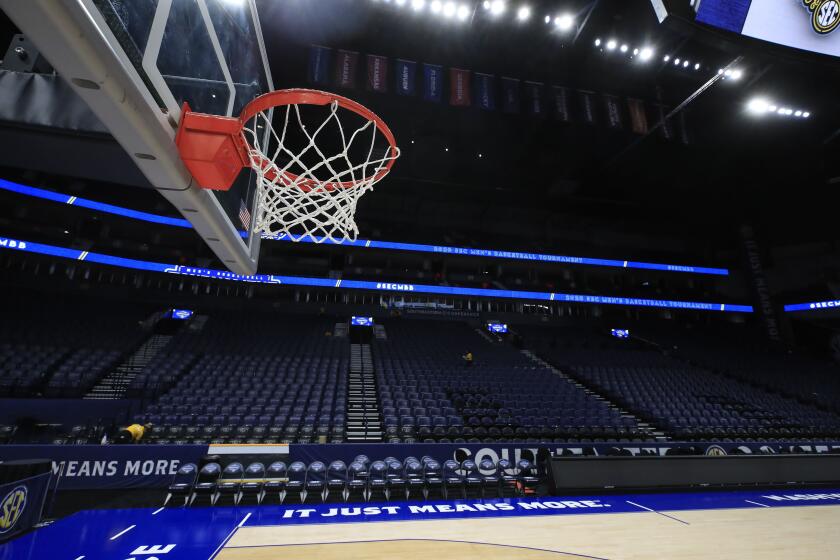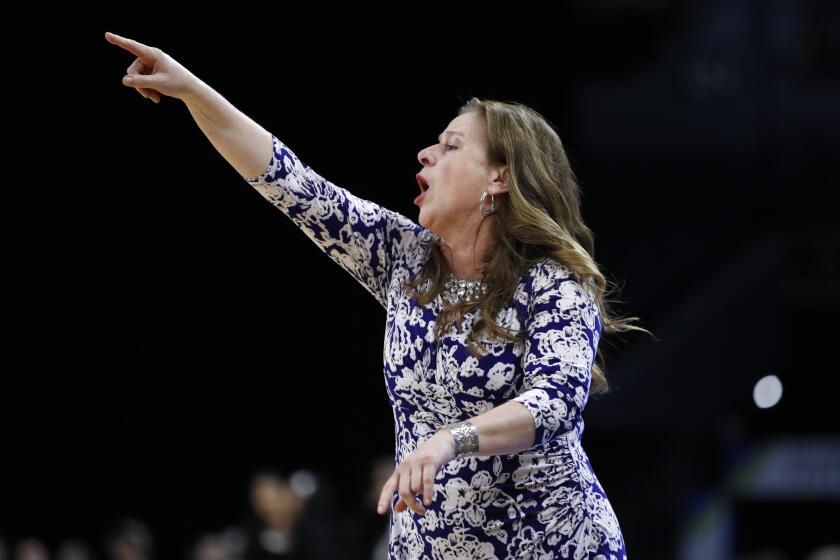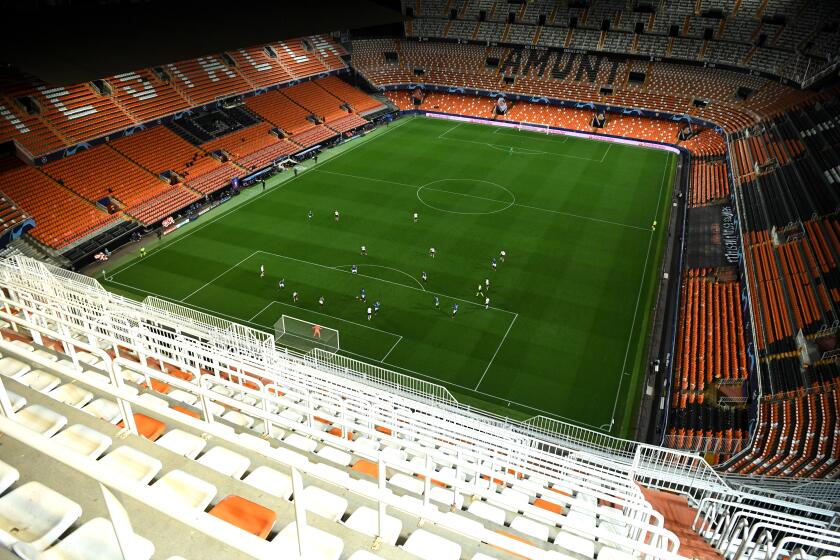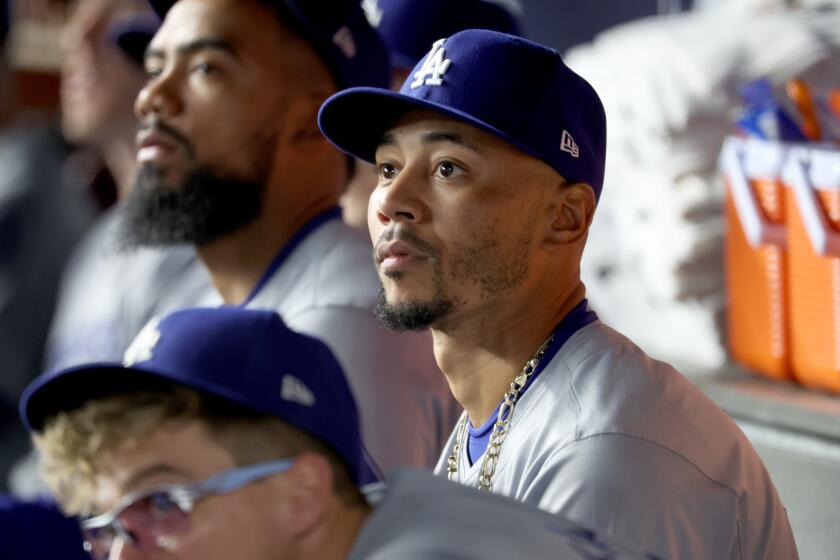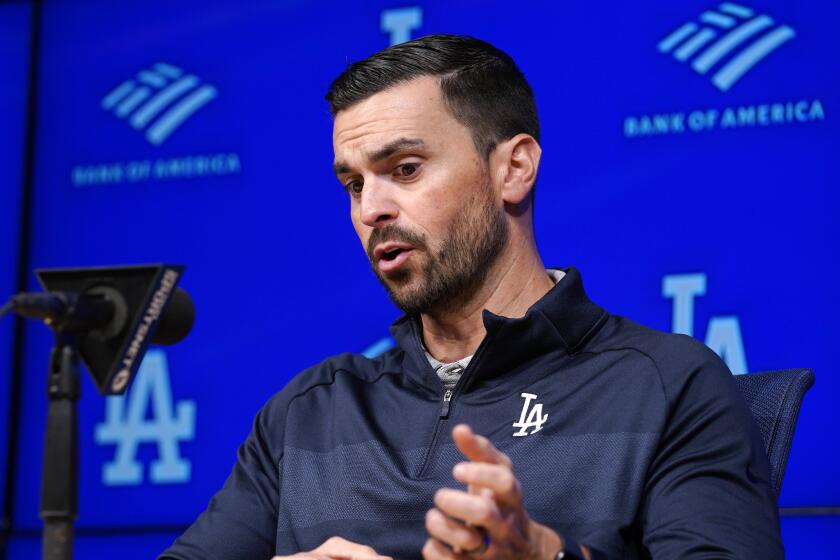Column: The day sports stopped
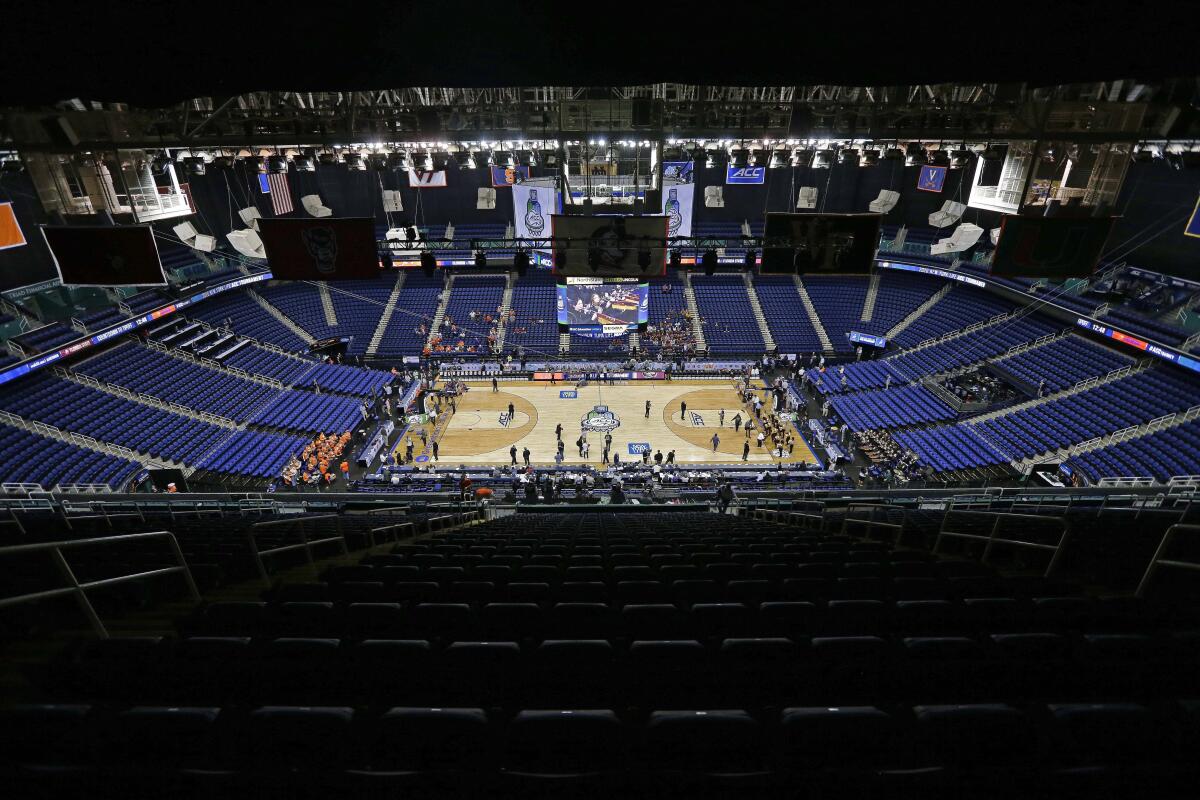
What do we do now? What do we watch? Whom do we cheer? How do we cheer?
I planned to spend this weekend awash in the excitement of conference college basketball tournaments, particularly the desperate season-saving journeys of USC and UCLA.
Those courts have been emptied.
Friends were headed to Sacramento to watch the state high school basketball championships, especially the Hollywood-draped team from Chatsworth Sierra Canyon.
Those games have disappeared.
A buddy from Dallas was coming to town Monday to join me in watching the Clippers host the Mavericks in a possible playoff preview.
Staples Center will be locked.
My favorite four days in the sports calendar were next week, the first rounds of March Madness, an event that annually brings together the country with millions participating in office pools and school pride.
For the first time in its 81 year history, the NCAA basketball tournament was canceled as the sports world continues efforts to control the coronavirus.
Every bracket has been busted.
The month was going to splendidly culminate in two weeks, opening day, Dodger Stadium, Clayton Kershaw back on the mound, the hated San Francisco Giants in the other dugout, friends already asking if I can find them a ticket.
Chavez Ravine will be closed.
Finally, in exactly three weeks, I couldn’t wait to make the trip to Anaheim to watch, and listen, as the Angels opened their home schedule against a sure-to-be-booed Houston Astros team that cheated the Dodgers out of the 2017 World Series championship.
The stadium will be shuttered.
Where do we go now? How do we connect with our friends? What do we talk about at work?
Thursday will be forever remembered as the day sports went dark, turning off its lights, nailing plywood over its windows, bolting its doors to the insidious approach of the coronavirus.
Left outside in the cold is a nation full of fans whose silenced passion will have a profound effect on this country’s spirit.
The one thing that has long helped America endure a national crisis was its games and, now, suddenly, just as this health crisis is peaking, the games have disappeared, poof, vanished.
Just when we need to hear cheering, there is nothing to cheer for. We could all use a good fight song, but the bands have been silenced. Everyone is looking for a hero, but the heroes have been banished.
College basketball, gone. Professional basketball, suspended. Baseball, suspended. Soccer, suspended. Hockey, suspended.
The best sports month of the year, canceled.
Granted, there is still horse racing and the chase to sign Tom Brady. But for now, the games and events that have long connected neighbors, bonded communities, and led to a shared cheering of a team against another team, are done.
The blackout could last at least a month, maybe more. For many whose days revolve around highlights and news and debates, it is an unimaginable stretch that will feel like an eternity.
How many times do you check your phone for a score? How often do you endure a mundane workday because of the promise of a great game that night on TV? How many of the best conversations in your daily life revolve around sports?
Welcome to cold turkey.
Yes, certainly, smart people will sigh at your discomfort and urge you to fill this sports vacancy with books and Netflix and intelligent debates, and that’s all good.
Just don’t let them tell you to get a life. Sports is a life, one engaged in by millions in many different ways, and a month without cheering and jeering and hugging and taunting will drain a feverish and chilled America.
The UCLA women’s basketball team’s season came to a premature end when the NCAA announced the cancellation of the men’s and women’s tournaments.
COVID-19 has ripped through a connective tissue of our society that is consistently unmatched by any other national passion and, in doing so, it has sadly turned some reliable truths on their head.
Sports have always distracted us from the realities of life. Now it has become the awful focus of those realities, which include the awful impact of cancellations on stadium workers who depend on games for their livelihoods. Here’s guessing many people, even non-sports fans, didn’t take the pandemic seriously until the NBA suspended its season.
Sports have always been a vehicle to bring us together. Now it has become frighteningly symbolic of the danger in us being together. The voice of the pandemic is not one of a health official, but that of the public-address announcer urging fans to the leave the arena Wednesday night in Oklahoma City.
That’s what makes this so unsettling. Sports were supposed to be stronger than this. Sports were supposed to be healthier than this. For fans, losing sports is about more than just losing games. It’s about losing part of the foundation on which you view yourself.
What are you going to watch on ESPN? How will your favorite sports-talk radio show talk? What kind of stories will this sports section publish?
There are so many things sports fans have come to depend upon that have suddenly evaporated in a manner we didn’t think was possible.
We love the certainty of championships. Yet quite unbelievably, there will be no NCAA men’s or women’s basketball champion this year. The shining moments have been darkened. Cinderella has been cut. Nobody will be dancing.
The tournament cancellations, at both the high school and college levels, represent the virus’ bite at its most vicious. Hundreds of seniors who spent four years working for one last shot of glory have watched their dreams instantly expire. It’s totally necessary, but completely unfair, and if the seniors aren’t given an extra year of eligibility — unlikely, it would seem — it would be a brutal final bit of their college education.
We love the final-month fight for seeding for the NBA playoffs. Yet by the time the league resumes, that fight may be little more than a short scuffle if the season is shortened. So much drama will be lost. So much of the season-long momentum built by a team like the Lakers could disappear.
Here’s a list of the sports events canceled because of coronavirus concerns
We love following the final spring training machinations that lead to baseball’s glorious opening day. Are they ready? Who’s playing second base? All that anticipation will now be lost, opening day will be sprung on us at the last minute and who knows where it will be? It won’t feel glorious, but forced, and the season probably will be shortened, and we hate those asterisk seasons.
But mostly, we love to watch. We love the Dodgers on Sunday afternoons, the Lakers on Tuesday nights, March Madness at 2 p.m. on a Thursday, LAFC on Saturday nights downtown and the Kings any night at Staples Center.
We love the feel and flow of sports all the time, on the radio going to work, at the water cooler during lunch, late at night on a sports highlight show after the kids have gone to bed.
Sports inspires, enrages and empowers us through our daily lives, and during this time of national panic, it is the one cornerstone we thought we could lean upon.
Yet, at least for the next month, sports have been dramatically pulled out from under us.
Seriously, what the hell are we supposed to do now?
More to Read
Go beyond the scoreboard
Get the latest on L.A.'s teams in the daily Sports Report newsletter.
You may occasionally receive promotional content from the Los Angeles Times.

